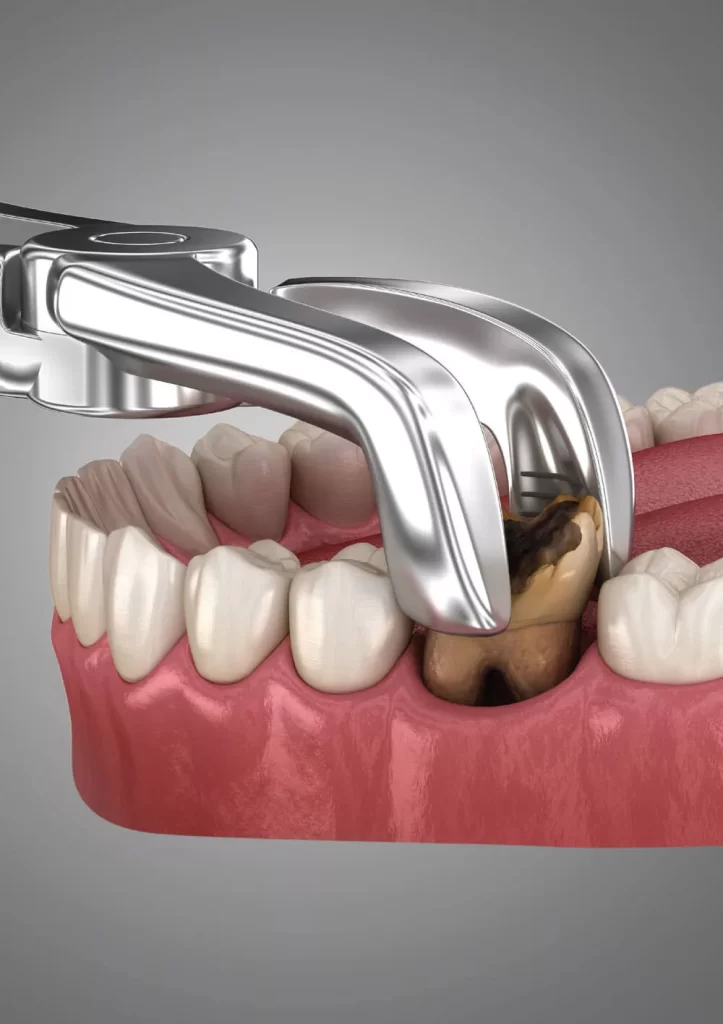- About us
- Dental Problems
Teeth & Gums
Cosmetic Improvement
Common Issues
- Treatments
Dental Services
Cosmetic Dental Services
Dental Specialists
- Before & After
- Patient Safety
- Contact
- Blog
-
Clinic Timing
12:00pm to 9:00pm
- About us
- Dental Problems
Teeth & Gums
Cosmetic Improvement
Common Issues
- Treatments
Dental Services
Cosmetic Dental Services
Dental Specialists
- Before & After
- Patient Safety
- Contact
- Blog
Treatments
Tooth Extraction
You can feel anxious if you need to have a tooth pulled. In reality, tooth extraction is extremely frequent. The removal of a tooth from the jawbone is known as a tooth extraction. When a tooth has sustained too much damage to be restored, it usually needs to be extracted. A dentist may remove a tooth for other reasons, such as decay, infection, or crowding.
The procedure of extracting a tooth is frequently carried out by a dentist, but occasionally you will need to visit an oral surgeon. Don’t worry. Even though it differs from having a filling, the treatment is typically short and probably not as painful as you would have thought.
What is it?
Your dentist will try to save a damaged tooth by employing dental procedures like root canals therapy, crowns, or fillings. The tooth must be extracted if the damage is too severe.
Only a dentist or expert can determine whether a tooth has to be pulled. Your teeth and mouth will be examined and evaluated at your initial session, and the best course of action will be suggested. Regular dental checkups and good oral hygiene can frequently avoid the need for tooth extraction.

Need To Know
Appointments
- Usually 1 or 2 appointments
- At the first consultation visit your dentist will examine your teeth. If possible he/she will extract the teeth right away or give you the next appointment.
- At the second visit you will have your tooth or teeth extracted.
- Further appointments may be needed if you have any problems or issues with your extraction.
How long it takes
- The consultation will usually take around 30 minutes
- The extraction will usually take around 30 to 60 minutes
Before your appointment
- For the consultation you won’t need any special preparation, but you should have knowledge to hand about your dental and medical history.
Before surgery with intravenous or IV sedation you should: - Take pre-operative medication at the time prescribed
- Have someone accompany you and drive you to your appointment
- Follow the pre-sedation fasting protocol given to you by your dentist
- Wear something warm and comfortable with loose sleeves.
After your appointment
If you have had any teeth extraction procedure done:
- Use ice packs as much as possible to prevent swelling during the first 48 hours
- Do not rinse your mouth out on the day of the surgery as it will cause bleeding
- Do not smoke for as long as possible after surgery
- Be careful with hot food and drinks
- Eat a soft food diet
- On the day after the removal, rinse three times a day after meals with warm, salty water
- Use Savacol mouthwash from the following day, morning and night.
- Be accompanied home.
- Rest for around 2 to 4 hours following surgery.
You may be asked about
- Your dental history and medical history
- Medications you are currently taking
- Your normal oral care routine at home
Quick tip
- It’s normal to experience some swelling and discomfort following wisdom teeth removal. We usually recommend taking a couple of days off work to rest. It’s also normal to experience some bleeding or slight oozing from the wounds after the extraction. Your dentist will give you gauze to help control the bleeding. You will need to bite down with gentle pressure for around 20 to 30 minutes if this happens.
FAQs
01. How much does it cost to have a tooth extracted?
The cost of getting a tooth extracted will depend on your situation and how difficult the procedure is. In some cases a dentist will be able to extract your tooth at a dental practice. However sometimes you may need to get the tooth or teeth extracted by an oral surgeon under sedation. Getting teeth removed under sedation is more expensive. At your consultation your dentist or specialist will let you know how much you can expect to pay for extraction.
02. Is tooth extraction painful?
When you get a tooth or teeth extracted your dentist will make sure you feel as comfortable as possible during the procedure. The dentist will usually numb the area getting treated first so that you won’t feel any pain. If you are being sedated for oral surgery, this will prevent you from experiencing any pain and will help you feel relaxed during the surgery. You may experience a little discomfort but the procedure is usually painless.
03. Can you prevent tooth extraction?
Similar to most dental problems, tooth extraction can usually be prevented with regular dentist visits and good oral hygiene. However, there are some situations where tooth extraction can’t be prevented such as wisdom tooth removal, extraction for orthodontic work and for extraction on people getting radiation or using cancer medications.
04. How long does it take to recover after tooth extraction?
The recovery time after tooth extraction often depends on the procedure. If you get teeth extracted at a dental practice the recovery time will usually be faster than if you’ve had teeth extracted by an oral surgeon, under sedation. In most situations you should be fully recovered from the extraction in about a week. You will need to make sure you follow the recovery instructions from your dentist. These will normally include rinsing your mouth with salt water the day after the procedure, using Savacol mouthwash, avoiding smoking and avoiding really hot and cold foods. You may also be prescribed medication to take following the procedure.

